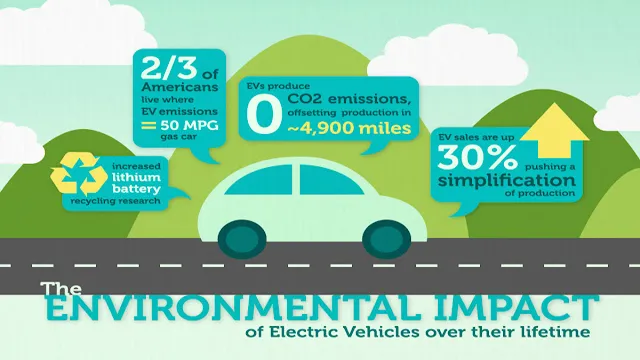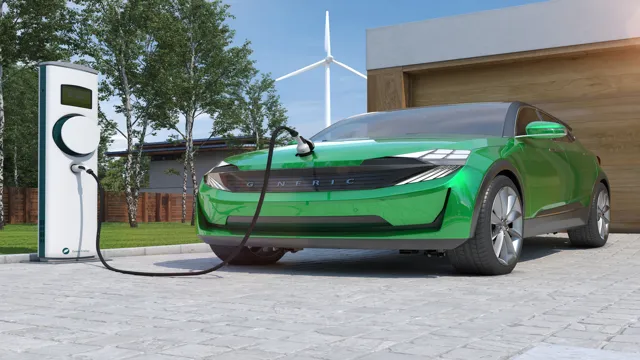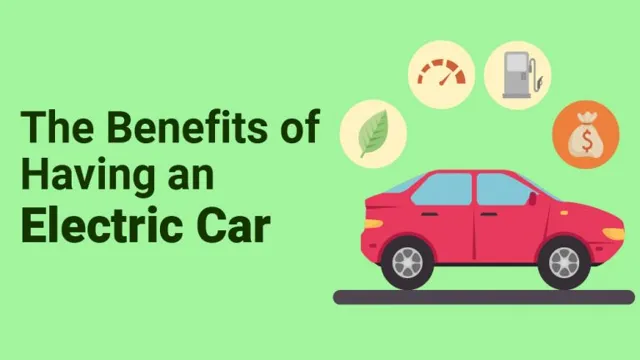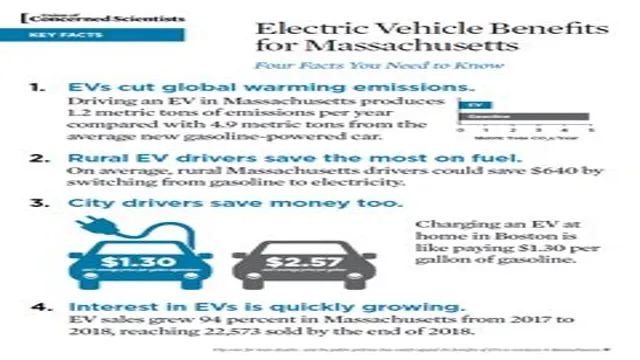Electric Cars: The Green Solution for a Sustainable Future – Benefits for the environment
Electric cars have become increasingly popular in recent years, with many drivers opting for them over traditional gas-powered vehicles. They offer a variety of benefits, including reduced emissions, lower operating costs, and enhanced performance. If you’re considering making the switch to an electric car, it’s important to understand the advantages they offer.
In this blog post, we’ll explore the benefits of electric cars in detail, from the financial savings to the environmental benefits. Whether you’re motivated by financial or environmental concerns, electric cars offer a host of compelling reasons to make the switch. So let’s dive in and explore the advantages of electric cars in more detail.
Reduced Emissions
When it comes to the benefits of electric cars for the environment, one of the most significant advantages is their reduced emissions. Unlike traditional gasoline-powered vehicles, electric cars don’t emit harmful pollutants that contribute to air pollution and global warming. Instead, they run on electricity, which can be generated from renewable sources like solar, wind, and hydro power.
This means electric cars have the potential to be zero-emission vehicles, which is a major win for the environment. But the benefits don’t stop there – electric cars also have better energy efficiency than gas cars, meaning they consume less energy and reduce the amount of greenhouse gas emissions associated with the production and transport of gasoline. Plus, with more electric cars on the road, there’s less demand for fossil fuels, which can help to reduce dependence on foreign oil and create a more sustainable energy future.
All in all, electric cars are a great way to reduce your carbon footprint and make a positive impact on the planet.
Electricity from renewable sources reduces CO2 emissions
Reduced Emissions Electricity generated from renewable sources can significantly reduce harmful CO2 emissions, which are the primary cause of climate change. Unlike traditional sources of energy such as coal and oil, renewable sources like solar, wind, and hydroelectric power generate electricity without releasing harmful greenhouse gases into the atmosphere. This means that replacing fossil fuels with renewable energy sources can have a significant impact on reducing carbon emissions and combating climate change.
For example, according to the International Energy Agency, the increased use of renewable energy could result in a reduction of up to 70% of CO2 emissions by 2050. This shows that by investing in renewable energy technologies, we can protect the environment and reduce our carbon footprint, ultimately leading to a more sustainable future. By reducing our reliance on fossil fuels, we can ensure that our planet remains a hospitable place for generations to come.
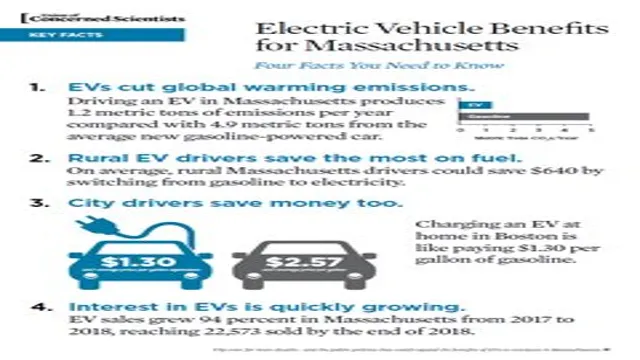
Electric cars have zero tailpipe emissions
One of the most significant advantages of electric vehicles is their ability to emit zero tailpipe emissions. Unlike traditional gasoline and diesel-powered cars, electric cars are powered by electricity, which means that they don’t produce any harmful pollutants. This is an important factor in reducing overall emissions and improving air quality.
With concerns about climate change and pollution on the rise, electric cars offer a solution that reduces the impact of transportation on the environment. Additionally, electric cars produce less noise pollution, making them a more pleasant vehicle to be around. As the world moves towards sustainable energy solutions, electric vehicles are becoming an increasingly popular choice for those looking to reduce their impact on the environment.
So, if you’re looking to contribute to a cleaner and healthier planet, think electric – they’re more than just a mode of transportation.
Improved Air Quality
When it comes to the environment, electric cars can have a significant impact on air quality. Unlike traditional gasoline-powered vehicles, electric cars produce zero tailpipe emissions. This means that they don’t release harmful pollutants like carbon monoxide and nitrogen oxides into the atmosphere.
As a result, the air is cleaner and healthier for humans, animals, and plants. In areas where air pollution is a major problem, electric cars can make a real difference in reducing the negative effects on people’s health. Plus, as more electricity comes from renewable sources, the environmental benefits of electric cars will only continue to grow.
So if you’re looking for a way to reduce your carbon footprint and improve air quality, an electric car might be just the solution you need.
Reduction in harmful pollutants such as NOx and particulate matter
Improved air quality is a critical reason why there has been a concerted effort to reduce harmful pollutants such as nitrogen oxides (NOx) and particulate matter. These pollutants are a serious public health concern, contributing to respiratory illnesses like asthma, emphysema, and lung cancer. When we switch to cleaner technologies, like electric vehicles or renewable energy sources, we can significantly reduce the amount of pollution we put into the air.
This not only improves our quality of life but can have long-lasting effects on the environment. Think of it like planting trees: the more you plant, the more you offset your carbon footprint. Similarly, every reduction in NOx and particulate matter emissions helps to promote a healthier, cleaner future for us all.
And the good news is that these changes are already happening. As more and more governments, businesses, and individuals become aware of the importance of reducing harmful pollutants, we can expect to see even greater progress towards improved air quality.
Less noise pollution
Improved air quality is one of the most significant benefits of decreased noise pollution. When we think about pollution, the first thing that comes to our mind is smog and exhaust gasses, but noise pollution also has a significant impact on air quality. Reducing noise pollution can lead to the reduction of harmful pollutants in the air.
The reason behind this is that noise pollution is often associated with traffic, and traffic jams have been proven to increase harmful emissions. When we reduce noise pollution, there are fewer traffic jams on the roads, resulting in a decrease in air pollution. Additionally, noise pollution can also impact our breathing patterns and cause respiratory problems.
By reducing noise pollution, we can breathe cleaner air and live in a healthier environment. Overall, it’s essential to recognize the connection between noise and air pollution and take the necessary steps to reduce both for the benefit of our health and the environment.
Reduced Dependence on Fossil Fuels
One of the significant benefits of electric cars for the environment is that they can help to reduce our dependence on fossil fuels. Since electric vehicles run solely on electricity, they don’t require any gasoline or diesel, which significantly reduces the amount of carbon emissions that vehicles produce. Additionally, electric cars don’t use any oil or require frequent oil changes, which means we can reduce our dependency on petroleum-based products.
By using electric cars, we can also help to reduce greenhouse gas emissions and other pollutants that are typically associated with the use of fossil fuels. Overall, electric cars provide a cleaner and more sustainable form of transportation while reducing our carbon footprint and protecting the environment.
Electricity can be generated from various sources
As concerns about global warming increase, so does interest in finding alternative sources of energy. One way to reduce dependence on fossil fuels is by generating electricity from other sources. These alternative sources include renewable energy sources like solar, wind, hydroelectric and geothermal energy.
Generating electricity from these sources decreases reliance on fossil fuels for energy production and helps to reduce carbon emissions. Wind turbines use wind energy to generate electricity, while solar panels absorb sunlight and convert it into electricity. Hydroelectric power is produced by harnessing the kinetic energy derived from flowing water, whereas geothermal energy utilizes the natural heat emanating from the Earth’s core.
By shifting to generating electricity from these sources, we can move towards a more sustainable, low-carbon future.
Reduced reliance on oil from foreign countries
Reduced Dependence on Fossil Fuels Reducing our dependence on fossil fuels has numerous benefits, including a reduction in our reliance on oil from foreign countries. With increasing concerns about energy security and climate change, it’s becoming more important than ever to find alternatives to fossil fuels. By using a combination of renewable energy sources such as wind, solar and hydro power, we can reduce our dependence on oil and other fossil fuels.
This not only improves our national security but also helps to reduce our carbon footprint, which in turn helps to combat climate change. But in addition to the environmental benefits, reducing our dependence on fossil fuels can help to boost our economy, create new jobs and invest in new technologies. With these benefits in mind, it’s clear that reducing our reliance on fossil fuels should be an important priority for us all.
Cost Savings
When it comes to the benefits of electric cars for the environment, cost savings are a significant factor. While the initial purchase price of electric vehicles (EVs) may be higher than their gas-powered counterparts, the long-term savings can be much greater. For starters, EVs require less maintenance since they have fewer moving parts that can wear down over time.
Additionally, electricity is cheaper than gasoline, so charging your EV is much less expensive than filling up a traditional car’s tank. Over the life of the vehicle, you could save thousands of dollars in maintenance and fuel costs. Furthermore, some states offer tax incentives for purchasing EVs, which can provide even more cost savings.
Ultimately, the benefits of electric cars for the environment are not just limited to reducing emissions; they can also save you money in the long run.
Lower fuel costs compared to gas-powered cars
When it comes to cost savings, electric cars are the clear winner over gas-powered cars. One of the biggest expenses associated with owning a car is fuel costs, and electric cars are known for their lower fuel costs. This is because electricity is cheaper than gas, and since electric cars run on electricity, their fuel costs are significantly lower.
In fact, it’s estimated that electric cars can save owners thousands of dollars in fuel costs over the lifetime of the car. Plus, since electric cars rely on regenerative braking to recharge their batteries, owners can save even more money by not having to replace brake pads as often as they would with a gas-powered car. So not only do electric cars help the environment, they can also help your wallet in the long run.
Electric cars require less maintenance, saving money over time
Electric cars are becoming more and more popular, as people look for ways to reduce their carbon footprint and save money in the long run. One major advantage of electric cars is that they require less maintenance compared to traditional gas-powered vehicles. This translates into cost savings over time, as there are fewer parts that need to be replaced and fewer fluids that need to be changed.
For example, electric cars don’t have oil changes because they don’t have engines that rely on oil to function. Additionally, electric car brakes last longer because they rely on regenerative braking, so they don’t wear down as quickly as traditional brake pads. All in all, electric cars require less maintenance, saving you both time and money.
Furthermore, electric cars use fewer overall parts, which means that there are fewer things that can go wrong. This means that electric cars maintain their value better over time compared to traditional gas-powered vehicles. Investors have taken notice, which has led to a sharp increase in the number of companies that manufacture electric cars.
All things considered, electric cars are worth considering if you want to save money in the long term and reduce your environmental impact.
Conclusion
In conclusion, electric cars have become the Tesla of the automotive world, leading the charge for a cleaner and more sustainable future. By relying on electricity instead of gasoline, these fuel-efficient vehicles help to reduce air pollution, greenhouse gas emissions, and our dependence on foreign oil. Plus, with their sleek designs and high-tech features, electric cars make driving feel like a futuristic adventure.
So if you’re looking to reduce your carbon footprint without sacrificing style or performance, an electric car may be just the spark you need to ignite your eco-friendly journey.”
FAQs
How do electric cars benefit the environment?
Electric cars emit fewer greenhouse gases and pollutants, leading to cleaner air and a healthier environment.
Do electric cars require less energy than traditional cars?
Yes, electric cars are more energy-efficient, using more of the energy stored in their batteries to power the vehicle.
What impact do electric cars have on reducing carbon emissions?
Electric cars produce zero emissions while driving, meaning they have the potential to significantly reduce carbon emissions and combat climate change.
Are there any other environmental benefits of electric cars?
Yes, electric cars also reduce dependence on fossil fuels, which are a finite resource and have negative environmental impacts when extracted and burned.
